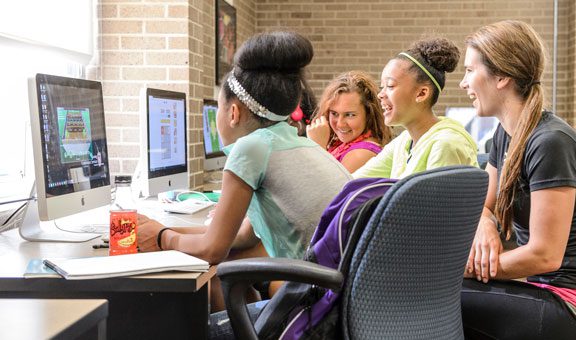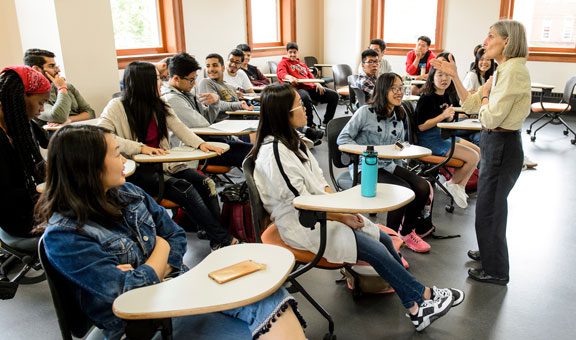Who Should Apply?
Summer Term Igniter Funds are for instructors, department chairs, summer deans, cross-campus workgroups, or administrators interested in developing innovative summer programming and initiatives.
Looking for support for online course development? Please visit the online learning page to learn more.
Precollege

Credit or noncredit courses or programs focused on rising high school students to prepare for academic success.
Example: High school students worked with mentors to program video games during a Gaming for Girls Pre-College Enrichment Opportunity Program for Learning Excellence (PEOPLE) workshop.
Early start

Courses or programs for admitted freshmen to start at UW-Madison before their first fall semester to get an early start on campus life and academics.
Example: International Student Summer Institute (ISSI) launched summer 2017. A new program that lets first-year international students arrive several weeks ahead of the fall semester and take an academic reading and writing class for non-native English speakers. The students also participate in a wide array of campus and community activities and meet current domestic and international students, all with the goal of helping them acclimate to U.S. life.
To submit a proposal, interested parties must complete 1) the proposal form and 2) the Signature Form. A list of proposal questions is available to preview before submitting the online form.
It may be necessary to meet with instructional designers, market researchers, or other relevant resources before awarding a proposal.
Goals
Submissions should meet one or more of the following course development goals.
- Address demonstrated student instructional demand
This may include courses that fulfill undergraduate requirements, e.g., general education or school/college breadth requirements, gateway courses, entrance to the major, major requirements, or courses that consistently have long waitlists. - Improve student skills in their major, field, or career
This may include summer course(s) that offer students an opportunity to gain hands-on experience or employable skills learned in majors, certificates, and courses (e.g., lab skills boot camp). - Incorporate a “beyond-the-classroom” experience
This may include pairing an internship, service-learning, or research with a relevant course offering to enhance the student experience. - Attract new student populations not currently served in the summer term
New student populations may include visiting students from other universities or international students. - Improve time to degree
With rising student costs, we want to help students reduce time to degree.
These funds are intended to support the development of summer courses and programs. Every course will be designed around its own set of unique student learning objectives. Faculty and instructors will be provided with tools and resources to successfully launch their course. The following are award requirements:
- Academic departmental and school/college commitment
The course will be supported by its academic department and school or college. A faculty or academic staff member may lead the effort but there should be departmental support. A range of instructors should be available to deliver the course if the original instructor is no longer able or no longer wishes to teach the course. The expense for delivering the course in the summer will be paid by the department/school/college. Special funds are not available for the delivery of courses. - Demonstrated student demand
The course should project high student enrollment and/or identify a curriculum need currently unmet. - Course offered consistently in summer and appropriately maintained
The academic department and school or college should aim to deliver the course consistently to aid in student planning. The best way to ensure consistency is to offer the course a minimum of 3 consecutive summers. Additionally, it is the responsibility of the academic department and the school/college to ensure proper maintenance of the course, especially for online courses (e.g., update materials, version control, continuous improvements, and technology enhancements). Departments that cannot commit to the ongoing instructional (salary, fringe, supplies) and maintenance costs to offer the course consistently in the summer should not accept the development funding. - Learning objectives and assessment plan
The summer course should develop clearly defined learning objectives and include a plan for assessment. - Collaboration with assigned instructional design team
Online courses: Online design, development and production staff time and expertise will be provided to awardees. Instructional design staff will work with instructors to achieve course development goals, align with instructional design standards, meet web accessibility standards, and comply with copyright policy. Note: based upon experience, 50-100 hours is the average length of time instructors spend to develop an online course that meets web-based instructional standards. Additional time will be required to participate in relevant training as needed (see below).
Face-to-face courses: Assistance with developing learning outcomes or assessments will be provided to awardees. - Participation in online course design and facilitation sessions (online only – apply now)
Instructors who receive an award for online development will participate in online design and facilitation sessions (no more than 20 hours over the course of a calendar year) designed to help you collaborate with and receive support from peers and instructional design experts and apply design and teaching best practices to your own course.
This funding will provide support for course or program development in summer. It is important to note that courses receiving funding will first be delivered in summer 2022.
Up to $15,000 will be awarded for each project. School/College Summer Deans and Budget Officers will be responsible for arranging transfers to departments. Award amounts are subject to change based on availability and scope of projects.
Timeline
Tentative call scheduled fall 2021-2022
